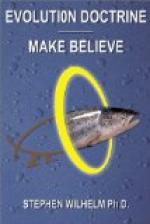We must devote some time to the subject of inheritance at a later juncture, but before leaving the matter an additional point must be established here; the selective process deals immediately with congenital results, as the heritable characters that make for success or failure in life, but by doing this it really selects the group of congenital factors behind and antecedent to their effects. For example, an ape that survives because of its superior cunning, does so because it varies congenitally in an improved direction; and the factors that have made it superior are indirectly but no less certainly preserved through the survival of their results in the way of efficiency. Hereditary strains are thus the ultimate things selected through the organic constitutions that they determine and produce.
Natural selection, as the whole of this intricate process, is simply trial and error on a gigantic scale. Nature is such that thousands of varying individuals are produced in order that a mere handful or only one survivor may be chosen to bear the burden of carrying on the species for another generation. The effect of nature’s process is judicial, as it were. We may liken the many and varied conditions of life to as many jurymen, before which every living thing must appear for judgment as to its fitness or lack of it. A unanimous verdict of complete or partial approval must be rendered, or an animal dies, for the failure to meet a single vital condition results in sure destruction. Of course, we cannot regard selection as involving anything like a primitive conscious choice. It is because we individualize all of the complex totality of the world as “Nature” with a capital N that so many people unconsciously come to think of it as a human-like personality. He who would go further and hold that all of nature is actually conscious and the dwelling-place of the supernatural ultimate, must beware of the logical results of such a view. What must we think of the ethical status of such a conscious power who causes countless millions of creatures to come into the world and ruthlessly compels them to battle with one another until a cruel and tragic death ends their existence?
But that is a metaphysical matter, with which we need not concern ourselves in this discussion; the important point is that among the everyday happenings of life are processes that are quite competent to account for the condition of adaptation exhibited by various animal forms. These processes are real and natural, not imaginative or artificial, and so they will remain even though it will become clear that much is still to be learned about the causes of variation and the course of biological inheritance. Darwin was the first to contend that natural selection is but a part of nature’s method of accomplishing evolution. As such it is content to recognize variations and does not concern itself with the origin of modifications; it accepts the obvious fact that congenital variations are inherited, although it leaves the question as to how they are inherited for further examination. Because the doctrine of natural selection does not profess to answer all the questions propounded by scientific inquisitiveness, it must not be supposed that it fails in its immediate purpose of giving a natural explanation of how evolution may be partly accounted for.




